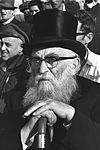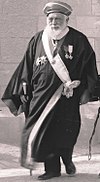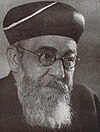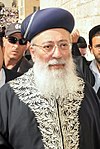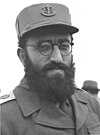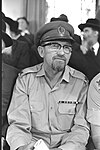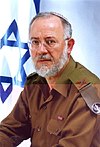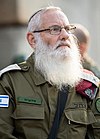Chief Rabbi is a title given in several countries to the recognized religious leader of that country's Jewish community, or to a rabbinic leader appointed by the local secular authorities. Since 1911, through a capitulation by Ben-Zion Meir Hai Uziel, Israel has had two chief rabbis, one Ashkenazi and one Sephardi.
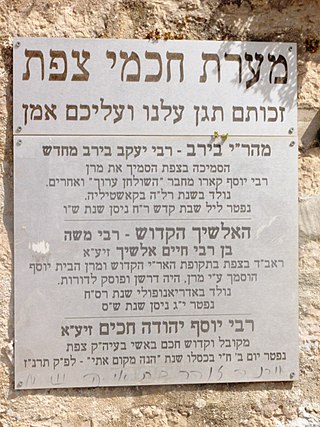
Jacob Berab, also spelled Berav or Bei-Rav, known as Mahari Beirav, was an influential rabbi and talmudist best known for his attempt to reintroduce classical semikhah (ordination).

Isser Yehuda Unterman was the third chief rabbi of Tel Aviv, and later the third Ashkenazi Chief Rabbi of the State of Israel from 1964 until 1972. He was a leader of the Mizrachi movement and was awarded the Rabbi Kook Prize for Rabbinic Literature in 1954.

Mercaz HaRav is a national-religious (Hardal) yeshiva in Jerusalem, founded in 1924 by Ashkenazi Chief Rabbi Abraham Isaac Kook. Located in the city's Kiryat Moshe neighborhood, it has become the most prominent religious-Zionist yeshiva in the world and synonymous with Rabbi Kook's teachings. Many Religious Zionist educators and leaders have studied at Mercaz HaRav.
Chananya Yom Tov Lipa Teitelbaum was the Grand Rebbe of Siget, and the author of Kedushath Yom Tov, a Hasidic commentary on the Torah he wrote in 1895.

The Charedi Council of Jerusalem is a large Haredi Jewish communal organization based in Jerusalem. It has several thousand affiliated households and is chaired by the Gaon Convenor (Ga'avad). The Council provides facilities such as dietary laws supervision, ritual baths, a Sabbath enclosure, and welfare services.
Moshe ibn Habib was the Rishon LeZion, Hakham Bashi and the head of a major yeshiva in Jerusalem.

Yaakov Meir CBE (1856–1939), was an Orthodox rabbi, and the first Sephardic Chief Rabbi appointed under the British Mandate of Palestine. A Talmudic scholar, fluent in Hebrew as well as five other languages, he enjoyed a reputation as one of Jerusalem's most respected rabbis.
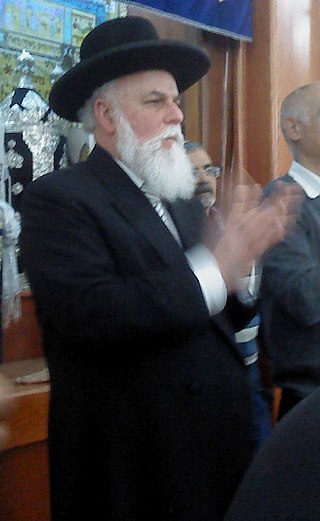
Rabbi Yitzhak Haim Peretz is a former Israeli politician who held several ministerial portfolios during the 1980s and early 1990s.
The history of Palestinian rabbis encompasses the Israelites from the Anshi Knesses HaGedola period up until modern times, but most significantly refers to the early Jewish sages who dwelled in the Holy Land and compiled the Mishna and its later commentary, the Jerusalem Talmud. During the Talmudic and later Geonim period, Palestinian rabbis exerted influence over Syria and Egypt, whilst the authorities in Babylonia had held sway over the Jews of Iraq and Iran. While the Jerusalem Talmud was not to become authoritative against the Babylonian Talmud, the liturgy developed by Palestinian rabbis was later destined to form the foundation of the minhag Ashkenaz that was used by nearly all Ashkenazi communities across Europe before Hasidic Judaism.
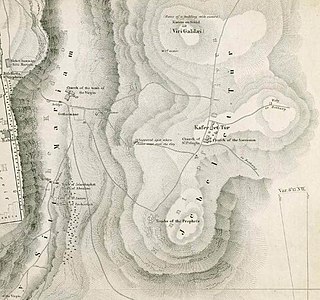
The Jewish Cemetery on the Mount of Olives is the oldest and most important Jewish cemetery in Jerusalem. The Mount of Olives has been a traditional Hebrew/Jewish burial location since antiquity, and the main present-day cemetery portion is approximately five centuries old, having been first leased from the Jerusalem Islamic Waqf in the sixteenth century. The cemetery contains anywhere between 70,000 and 150,000 tombs, including the tombs of famous figures in early modern Jewish history. It is considered to be the largest and holiest historical Jewish cemetery on earth.
Yaakov de Castro, alternative spelling: Yaakov Costaro and Jacob ben Abraham Castro (1525–1610), was a rabbinic scholar, judge and exponent of Jewish law in Cairo, Egypt. A descendant of Jews who fled Portugal during the time of the Portuguese Inquisition, his family eventually came to settle in Egypt. A student of the illustrious Radbaz, he is considered the last Chief Rabbi of Egypt to hold sway over the entire Jewish community in Egypt, mostly Musta'arabi Jews, after the abolition of the office of nagid, and whose halachic rulings were widespread across the land. He was a nephew of the master of the mint for the Ottoman Sultan in Cairo, Abraham de Castro.

Yom Tov Algazi, the son of Israel Yaakov Algazi, was an Ottoman rabbi who studied under Rabbi Shalom Sharabi and authored major halakhic works. He succeeded Sharabi as head of Beit El and served as Chief Rabbi of Jerusalem and the rest of the country from 1773, after his father in law Raphael Moshe Bula passed away shortly after being appointed in 1772, until his death in 1782.

Yaakov Eliezer Kahana Shapira is the rosh yeshiva of the Mercaz HaRav yeshiva in Jerusalem and a member of the Chief Rabbinate Council.
Israel Yaakov Algazi (1680–1757) was a Jewish rabbi of Smyrna and Jerusalem, who served as Rishon LeZion for the last few years of his life.
The Yosef family is an Israeli family noted for prominent Mizrahi Rabbis, and for its involvement in Israeli politics through the Shas political party. Rabbi Ovadia Yosef, Sephardic Chief Rabbi of Israel from 1973-1983 and founder of Shas, was considered the pre-eminent leader of Mizrahi Jews during and after his lifetime. Yosef also founded the Badatz Beit Yosef, an agency for certifying a food's kosher status. The agency is one of the largest in Israel, and is a major source of wealth for the family.

Rabbi Kalman Meir Ber is the Ashkenazi Chief Rabbi of Israel and President of the Chief Rabbinate Council. Previously, he served as the rabbi of Netanya and as the rabbi of the Kerem Yeshiva in Yavne, among other positions.


